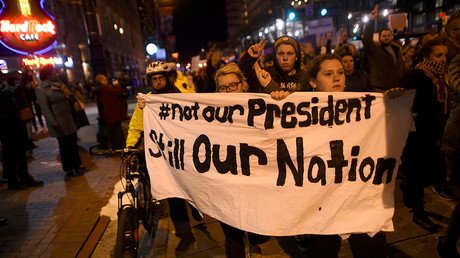Trump message to Europe: 'Era of free-loaderism is over'

America has a chance to have practical businessman approach with Trump instead of bullying and ideological approach of previous administrations, says former US diplomat, Jim Jatras.
America gripped by a second night of protests after Trump's win
In New York, supporters of Hillary Clinton have flooded the streets to vent their anger over the Republican's winning the presidency. And it's not only in New York where crowds have been rallying against Trump.
More protests are expected in New York, as well as Boston, Oakland and Seattle. The crowds are rallying against Trump's views on minorities, immigration and the current US administration.
They were also angry about his ambitious foreign policy pledges, from reforming NATO to healing ties with Russia.
RT: Trump made plenty of pledges during his campaign, from creating jobs and cutting taxes to reforming NATO. But he is a political newcomer. Will he be able to deliver on these?
Jim Jatras: I think he will be able to deliver all his promises, for a couple of reasons. There are a couple of challenges that I could outline, too. But there are two reasons I think he could deliver. One, he is approaching this in a pragmatic and non-ideological way. He is not a big visionary who is going to remake the whole world in our own image, regime change, all that stuff that has got the US into trouble under Obama, under Bush and so forth. The second thing is, I think he will take a businessman’s approach. He will be the Chairman of the Board and try to find the right people to do the right job and have limited, specific, attainable goals that he wants, rather than this continuous process of turning and making a big mess of things with no clear idea what the objectives are. The challenge is especially the foreign policy field. Can he find the people that agree with his gut-level instincts on these things who are not part of the problem, especially a lot of former Republican officials from earlier administrations who, frankly, a lot of them agree more with Hillary Clinton on these things than they do with Trump.
The plank that Trump walked the most and got a lot of support for is renegotiating the trade deals. Because there used to be a Clinton campaign slogan back in 1992 that goes, ‘It’s the economy, stupid.’ And that is what this is really about. So, between all the name calling and having two of the most unpopular candidates ever running for office in the US. What is really happening in the US is the same that is happening over there in Italy with the populist Five Star movement, with Le Pen’s movement in France, with the AfD party in Germany, with the Freedom Party in Austria. What it is, it’s an anti-elite movement. Trends Journal publisher Gerald Celente told RT.
RT: Some European leaders have already expressed their concerns about Trump as President. The French leader, Francois Hollande, said it's a time of uncertainly for relations between Europe and the US. What are your views on his reaction?
JJ: I take their uncertainty and their complaints in some cases and their whining as a compliment. Because what Mr. Trump is saying that the “era of free-loaderism is over.” And that we are going to look out for American interests first. I don’t think it is just in the crude terms are they paying their way in NATO, I think there is a subtext to that when you say we are going to get along with the Russians. If you guys, you European countries are so concerned about this “Russian threat,” why don’t you spend your own money? I think it is a left-handed way of saying “that threat is really not there, what is this all about?”
Norman Solomon, American journalist, media critic, former US Congressional candidate, told RT: "Trump has far-reaching promises but not far-reaching consistency. Particularly on foreign policy. Very erratic, not consistent and that remains to be seen. However, in his better statements his lack of belligerency towards Russia is certainly a positive possibility. Whether his foreign policy actually turns away from militarism is an open question."
RT: Trump has pledged to mend relationships on the international arena including those with Russia. Will he be able to push anything like that past the Republican hawks in Congress?
JJ: He doesn’t need to push much through Congress. Let’s remember, under our system, which is not a parliamentary system, the president has very broad authority, especially in the conduct of foreign affairs, and I think he will take a very personalized approach to foreign leaders, especially strong leaders when he feels he has a mutual respect on which to build a relationship. He certainly will take this position with President Putin, with Prime Minister Netanyahu, even with the Mexican president; I think we will see that developing with President Xi of China. So, I think he is ready to look across the table, to look another leader in the eye and do some hard bargaining for mutual advantage which is frankly what we need. A practical approach rather than this kind of bullying and ideological approach we’ve seen for the few last administrations.
The statements, views and opinions expressed in this column are solely those of the author and do not necessarily represent those of RT.













